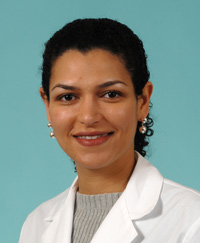Sleep apnea and cardiovascular health
Washington University is participating in a trial that is testing a new sleep apnea therapy
Central sleep apnea (CSA) is a unique form of sleep apnea where the brain fails to send signals to the diaphragm to breathe. The condition affects up to 40 percent of patients with heart failure and up to 50 percent of those who have suffered a stroke. Not only does CSA lower quality of life, it also contributes significantly to recurrent hospitalizations and can lead to a four-fold increase in deaths within two years of developing the condition.

Washington University School of Medicine has been chosen as one of 25 sites to participate in a prospective, multicenter, randomized trial that is testing a new therapy called the remedē® System for patients with CSA. Patients are implanted with a pacemaker-like device that stimulates the phrenic nerve, prompting the diaphragm to move if breathing stops. Participants are monitored to evaluate sleep quality and heart function.
The current study is following up on a previous pilot safety trial, which had promising results, says cardiologist Susan Joseph, MD, the trial’s principal investigator at Washington University.
For more information on the current trial, please visit the trial site on ClinicalTrials.gov.






